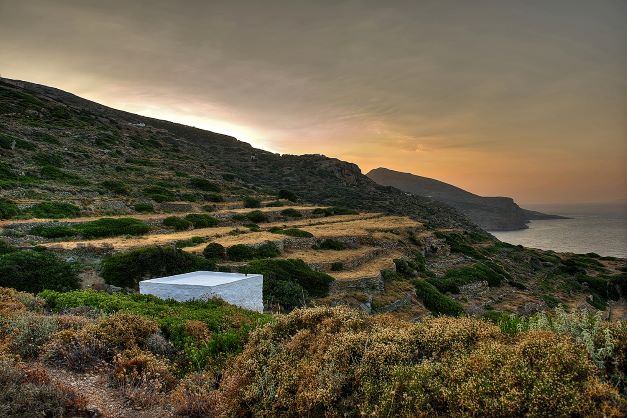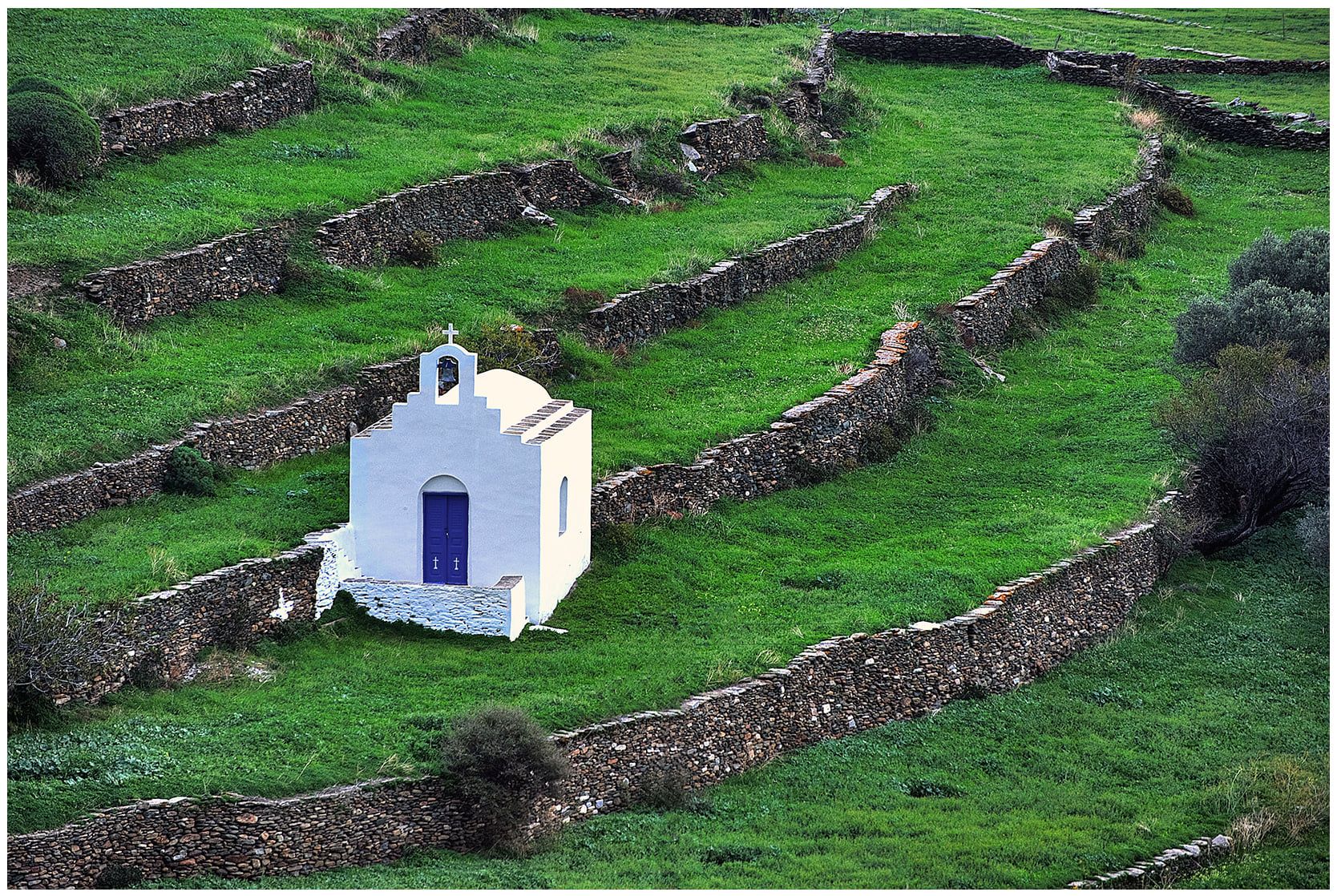

Introduction to the project and timeline
Being an Islander documentary investigates the theme of insularity as a social construct and as a form of social and cultural identity. We employ methodology from the fields of sensory archaeology and anthropology, experimental archaeology, and ethnographic approach to elucidate what defines island identities in the Eastern Mediterranean; a place where the European and the Asian-African geography, history and cultures intersect, using a specific island, Siphnos, Cyclades, Greece as a research model.
The undertaking of the Being an Islander documentary was the single most creative part of the research and engagement project. Research on the documentary’s content started in January 2021 with drafting the core ideas and case studies of the documentary’s content, followed by the recruitment of the production team. Dr Dimitrios Bouras, an acclaimed documentarist and photographer, brings his expertise in anthropological filmmaking and is an active member of the research team.
Filming started in Siphnos during early 2021 and continued in Cambridge during October 2021, with an array of interviews, including Professor Marcos Martinon-Torres of the Department of Archaeology & McDonald Institute for Archaeological Research and Dr David Evans, an expert on Contemporary Art. The main filming event took place in various locations on the island of Siphnos, between November -December 2021. Filming on location included numerous case studies of key ancient monuments, and over 40 interviews with experts in archaeology, anthropology, architecture, seafaring, and mobility, as well as members of the local communities engaged in diachronic crafts and economies of the island (potters, stonemasons, former mine workers, farmers, shepherds), local artists and representatives of the island’s authorities (the mayor of Siphnos, heads of the education and cultural associations, etc.).
We included several case studies, such as filming in the region of the ancient tower of Siphnos (‘phryctories’), a system of communication and signaling designed initially to protect the mining area of the island, but later also used to control agricultural landscapes, exemplifying the continuity of landscape use and resources in the island’s metalliferous regions. Another case study included filming at the Atsonios pottery workshop, which has been active for centuries, with the master potter describing his craft, resources, and long diachronic presence of Siphnian potters in the most engaging way. Pottery workshops, particularly those devoted to the manufacture of cooking pots has been a centuries old craft in Siphnos. The craft, entangled in the island’s connectivity, idiosyncrasies, and its resources, made a perfect episode of our documentary. Filming was completed when a smaller production and research team returned to the island in August 2022.
Production: ArkLab Limited
Executive producers: Dimitrios Bouras, Anastasia Christophilopoulou
Co-producers: Orestis Seferoglou, Manos Makrigiannakis, Kostas Grountas
Directors of Photography: Orestis Seferoglou, Dimitrios Bouras
Editor: Manos Makrigiannakis
Scriptwriters: Valia Tsirigoti, Βάλια Τσιριγώτη, Anastasia Christophilopoulou, Dimitrios Bouras
Narrators: Valia Tsirigoti, Kostas Grountas
Original Music: Kostas Grountas
Violin: Fotis Siotas | Rhodes: Kostas Tsiolis | Recordings/Mixing: Giorgos Liapis
Mastering: Yiannis Christodoulatos, Sweetspot Productions
Art Director: Kostas Pappas | Production Design: Amalia Symeonidou
Aerial Photography: Orestis Seferoglou | Color Grading: Orestis Seferoglou
Illustrations: Christina Tsevis (Crosti) | Graphics: Evangelos Sarantaris (Don Forty)
Production Assistant Greece: Andriana Theochari | Production Assistant UK: Jack Stephenson
Production Controller: Moysis Moyseos | Accounting, Financial Consultants: Istos Global Limited
Legal counsel: Nikoletta N. Charalambous
Principal researchers: Dr. Anastasia Christophilopoulou Dr. Dimitrios Bouras
Professor Marcos Martinon-Torres (Archaeological Science)
Dr. Nicholas Anastasopoulos (Architecture)
Dr. Anastasia Christophilopoulou (Archaeology)
Dr. David Evans (Contemporary Art)
Dr. Dimitrios Kostopoulos (Geology)
Dr. Christos Lynteris (Anthropology)
Ms. Maria Nadali (Mayor of Sifnos)
Dr. Nikos Panagiotou (Communication – Media)
Emerging from the geological past of the planet, the islands of the SE Mediterranean constitute a distinct example of continuous habitation of space, from prehistoric times to the present day. The natural spatial boundaries defined by the sea have led to the development of strong community bonds through a ‘closed code’ of social acceptance – a distinct profile with ‘particular’ mythologies. At the same time, limited natural resources defined the proper relationship with nature, without the need to mediate chatty ecological rhetoric. Unique characteristics shaped habitation behaviors and ways of living, which present exceptional archaeological, anthropological, and environmental interest, while at the same time offering valuable lessons.
Sifnos, as a research model of insularity, is characterized by the constant alternation between locality and movement. The ethics of reuse and the choices of a development that endangers the carrying capacity, the limits, but also the real needs of the place, are reshaping human geography. As physical and social space define each other, the lives of the residents are characterized by the constant striving that pushes these idiosyncratic communities towards erudition.
The sea, either through the geological past or through modern, multiple connections, constantly redefines the sense of the island’s borders, thus creating inter-island passages with complex social and cultural networks of exchange and mobility. It seems to shape the inhabitants over time, through forced emigration and repatriations, smoothing the internal “closed social codes” leading the society to welcome what can mean otherness.
The agricultural land, the water element, and the experiential relationship with the place, will also determine the development of traditional professions on the island of Sifnos, with pottery and seafaring being a dominant factor in social and economic transformations. The utilitarian character of popular island art will follow and, in turn, the evolution of rural society, taking on new forms of prosperity. The spread of tourism and the monopolization of the island economy will bring about new shapes in island identity.
The one-dimensional perception that the islands are a privileged holiday paradise removes from the body of insularity the versatility that belongs to it. Understanding the insular phenomenon and its uniqueness requires devoting time.
The documentary seeks to make visible the composition of the multifaceted forces that contributed to the diversity and multiple levels of memory of this human ecosystem. The present project attempts to break through the monothematic images of a nostalgic (touristic) Mediterranean and to give space to the narratives of its inhabitants. The polyphony of the islanders reminds us that the Aegean is not a picturesque outpost. A mosaic of different voices invites us to unfold with it the coexistence of contrasts and convergences, the symbiosis of differences and similarities, reminding us of the value of bonds.
At present, the documentary has achieved recognition by attracting two international awards and a finalist’s nomination to a third international film festival:
The documentary is providing research support and contributes to knowledge sharing to our wider network of Island Studies colleagues around the world, with screenings, discussions and research seminars taking place since January 2023 in the United Kingdom (London, Oxford, and Cambridge), Europe (France, Italy, Greece, and Germany), the United States and Australia. We are particularly proud of research screenings of the documentary that foster further discussion on Island Studies and the future of our discipline, such as the ones recently hosted by the JICAS (Jersey International Centre of Advanced Studies), July 2023, the Seeger Center for Hellenic Studies at Princeton University, June 2023; as well as combined seminars and screenings on the theme of Being and Islander project and documentary, recently held at the Cambridge Centre for Greek Studies, University of Cambridge (June 2023) and the Cyprus Institute, Nicosia (June 2023).
As engagement with the local island communities and the diasporic Greek, Cypriot and Italian communities remain at the heart of our project, we particularly value the wide dissemination the screening and discussions of the documentary has had in community events, on the island of Sifnos, in Greece, Cyprus, in London (hosted by our key partner, the Cyprus High Commission) and Sardinia (forthcoming).
The documentary, generously supported by the Stavros Niarchos Foundation, was produced with the kind permission of the Ministry of Culture, Greece and is under the auspices of the Municipality of Siphnos, region of Cyclades. The archaeological areas of Aghios Andreas and Sifnos pertain to the jurisdiction of the Ephorate of antiquities of the Cyclades. All rights of the presented monuments / archaeological areas belong to: Hellenic Ministry of Culture and Sports Hellenic Organization of Cultural Resources Development.
Special Thanks:
Dr. Nicholas Anastasopoulos, Dr. Dimitrios Kostopoulos, Dr. Ezra Barzilay
Municipality of Sifnos, Citizens of Sifnos.
McDonald Institute for Archaeological Research, University of Cambridge.
National & Kapodistrian University of Athens, Dept of Mineralogy & Petrology.
ZANTE ferries (official carrier)
Cultural Center of Sifnos, Antonis Atsonios Pottery, Vathy, Sifnos.
Archaeology, Anthropology, Ethnography, History, Island Studies, Visual Anthropology, Social Issues, Social Impact, Insularity, Mobility.





